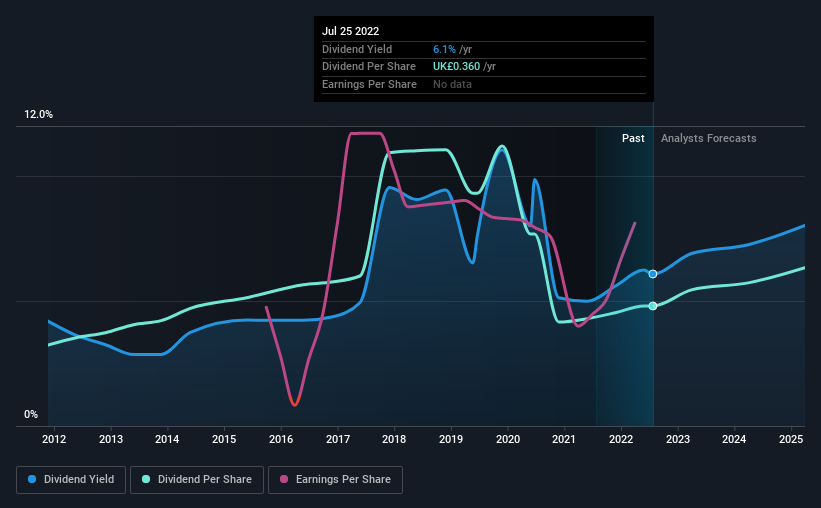PayPoint (LON:PAY) Has Announced That It Will Be Increasing Its Dividend To £0.09
The board of PayPoint plc (LON:PAY) has announced that it will be paying its dividend of £0.09 on the 30th of September, an increased payment from last year's comparable dividend. This makes the dividend yield 6.1%, which is above the industry average.
View our latest analysis for PayPoint
PayPoint's Payment Has Solid Earnings Coverage
Impressive dividend yields are good, but this doesn't matter much if the payments can't be sustained. Prior to this announcement, PayPoint's dividend was only 61% of earnings, however it was paying out 210% of free cash flows. This signals that the company is more focused on returning cash flow to shareholders, but it could mean that the dividend is exposed to cuts in the future.
Unless the company can turn things around, EPS could fall by 8.0% over the next year. Assuming the dividend continues along recent trends, we believe the payout ratio could be 63%, which we are pretty comfortable with and we think is feasible on an earnings basis.
Dividend Volatility
The company has a long dividend track record, but it doesn't look great with cuts in the past. The dividend has gone from an annual total of £0.243 in 2012 to the most recent total annual payment of £0.36. This works out to be a compound annual growth rate (CAGR) of approximately 4.0% a year over that time. We're glad to see the dividend has risen, but with a limited rate of growth and fluctuations in the payments the total shareholder return may be limited.
Dividend Growth Is Doubtful
With a relatively unstable dividend, it's even more important to evaluate if earnings per share is growing, which could point to a growing dividend in the future. It's not great to see that PayPoint's earnings per share has fallen at approximately 8.0% per year over the past five years. If earnings continue declining, the company may have to make the difficult choice of reducing the dividend or even stopping it completely - the opposite of dividend growth.
The Dividend Could Prove To Be Unreliable
In summary, while it's always good to see the dividend being raised, we don't think PayPoint's payments are rock solid. With cash flows lacking, it is difficult to see how the company can sustain a dividend payment. This company is not in the top tier of income providing stocks.
Companies possessing a stable dividend policy will likely enjoy greater investor interest than those suffering from a more inconsistent approach. Still, investors need to consider a host of other factors, apart from dividend payments, when analysing a company. Just as an example, we've come across 4 warning signs for PayPoint you should be aware of, and 2 of them make us uncomfortable. If you are a dividend investor, you might also want to look at our curated list of high yield dividend stocks.
Have feedback on this article? Concerned about the content? Get in touch with us directly. Alternatively, email editorial-team (at) simplywallst.com.
This article by Simply Wall St is general in nature. We provide commentary based on historical data and analyst forecasts only using an unbiased methodology and our articles are not intended to be financial advice. It does not constitute a recommendation to buy or sell any stock, and does not take account of your objectives, or your financial situation. We aim to bring you long-term focused analysis driven by fundamental data. Note that our analysis may not factor in the latest price-sensitive company announcements or qualitative material. Simply Wall St has no position in any stocks mentioned.
Join A Paid User Research Session
You’ll receive a US$30 Amazon Gift card for 1 hour of your time while helping us build better investing tools for the individual investors like yourself. Sign up here

 Yahoo Finance
Yahoo Finance 
